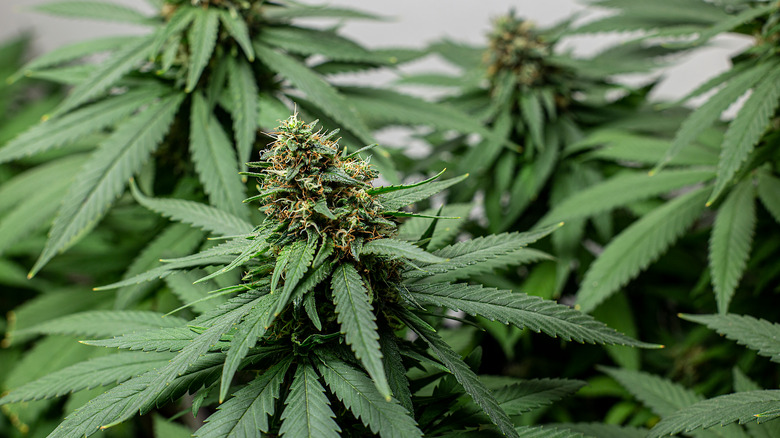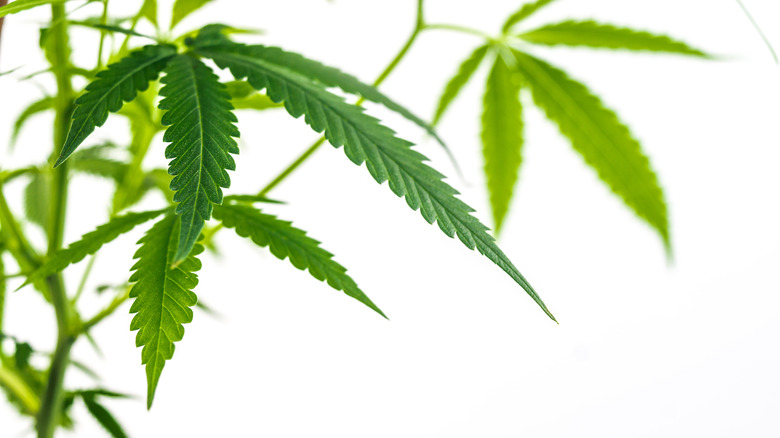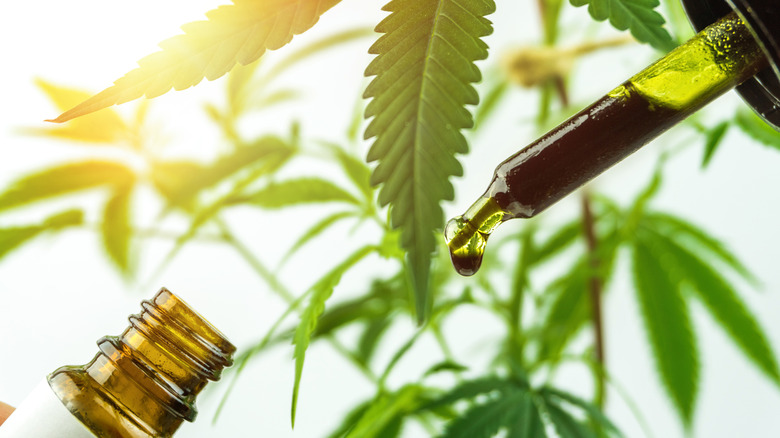What Is THCV In Cannabis And How Is It Different From THC?
Cannabis, sometimes referred to as marijuana, is a plant comprised of many different chemicals, including THC, which is responsible for its intoxicating effects. Another well-known cannabis chemical is CBD, which has become popular due to its potential medicinal benefits. These are, however, only two of the approximately 70 or more cannabinoids found in the cannabis plant, according to Fundacion Canna. Each phytochemical can contribute to the different effects one may feel after ingesting cannabis products, depending on the concentration of each. The varying cannabinoid quantities are responsible for different cannabis strains and the distinctly unique effects each may offer.
A lesser-known cannabinoid has been getting more attention lately, and it's called tetrahydrocannabivarin (THCV). The substance has become known for a variety of purported effects, and it could potentially serve as a solid alternative to THC or CBD, depending on what you're looking for. A growing body of research has found that THCV may be more energizing and better at suppressing appetite compared to THC, potentially offering these benefits without the paranoia some people experience from the latter chemical. However, THCV is not normally found in very high concentrations in cannabis, so these effects tend to be felt more subtly. As THCV gains popularity, demand for strains with higher THCV concentrations is growing.
What is THCV?
THCV is one of the many cannabinoids in the cannabis plant; its quantity varies and is particularly high in some strains from Africa or Asia, according to UNODC. This cannabinoid isn't psychoactive, meaning it doesn't produce the same intoxicating effects as THC. However, research has found that tetrahydrocannabivarin does cause some other effects related to appetite and energy levels.
The amount of THCV present in a typical cannabis flower varies and depends largely on the strain. However, the chemical tends to be present in far lower quantities than its better-known cannabinoid counterparts. The NIH shows that THCV is, chemically speaking, very similar to THC. It also works on the same cannabinoid 1 and 2 (CB1 and CB2) receptors in the brain. These receptors are responsible for regulating other neurotransmitters, as well as some physiological functions like appetite.
In the case of THC, it causes more activity at the CB1 receptor, increasing euphoric feelings and the drive to eat, as explained in a study published in the British Journal of Pharmacology. THCV, on the other hand, reduces activity at the CB1 receptor. This means that the cannabinoid can potentially reduce the effects of THC, including negative ones, in addition to suppressing appetite.
What is THCV good for?
Research has found that THCV may have many potentially beneficial effects and uses, including for the management of type-2 diabetes and aiding in weight loss (via BMC). It's difficult to know how substantially these effects can be felt when the chemical is consumed in typical concentrations alongside the many other cannabinoids found in cannabis. The amount of THCV present in the majority of strains isn't enough to feel intoxicating effects — though, in high-THCV cannabis strains, you may be able to feel them subtly.
Of particular interest is THCV's potential for suppressing appetite by blocking one of the brain's cannabinoid receptors known to have effects on hunger. Although cannabis is popularly known to increase appetite in many people, this effect does depend on which strain is being consumed. THCV has also been found to ease inflammatory pain, at least in mice (via NCBI). Assuming the chemical has the same effects in humans, THCV could potentially be helpful in managing conditions that involve inflammation-related pain.
Studies have also shown that THCV can help mitigate some of the negative side effects of THC (via King's College London), such as faster heart rates which can lead to feelings of anxiety. If you tend to feel these negative effects when consuming THC, trying THCV or a strain with high concentrations of the cannabinoid may help.
Will THCV get you high?
Whether you can feel the effects of THCV depends entirely on what you're consuming. In general, THC is the cannabinoid responsible for the high you feel from cannabis products. The lesser amounts of other compounds in the plant can have a more subtle effect on what kind of high you experience, and this includes THCV. If you want to feel more of the effects of THCV, you can try a strain with a higher concentration of the chemical, though it's unlikely you'll get intoxicated unless very high doses are consumed.
If you do take THCV by itself, research has found you likely won't feel anything from a low dose, though it can help decrease the negative side effects of THC. When it comes to higher doses of isolated THCV, however, there's speculation you may be able to feel some psychoactive effects, though additional research is necessary to say for sure. THCV is just one of the many chemicals that influence the effects of cannabis, and research has suggested that the full spectrum of cannabinoids and plant terpenes may be most beneficial when they work together rather than in isolation (via Healthline).
How is THCV different from THC?
THCV can potentially reduce the effects of THC because — though these compounds are more similar than they are different — they essentially work opposite of each other. Both cannabinoids act on the CB1 receptor in the brain, though where THC creates more activity there, THCV reduces it (via NIH). This is why it may be able to help reduce the negative effects of consuming too much THC at once, and why it decreases appetite while THC is notorious for making people feel hungrier.
Also, while THC is found in most cannabis strains, the UN's Office on Drugs and Crime found that THCV levels are high primarily in South African strains, making it a rarer compound. In general, THCV doesn't have as much of a noticeable effect as its psychoactive counterpart, and so it is often sought for different reasons than THC, including its potential medicinal qualities without unwanted side effects like paranoia and hunger. Whether you want to mellow out your THC high, get the appetite suppressant effects, or see if it helps reduce chronic pain, the research indicates that THCV may be a cannabinoid worth keeping an eye on.




